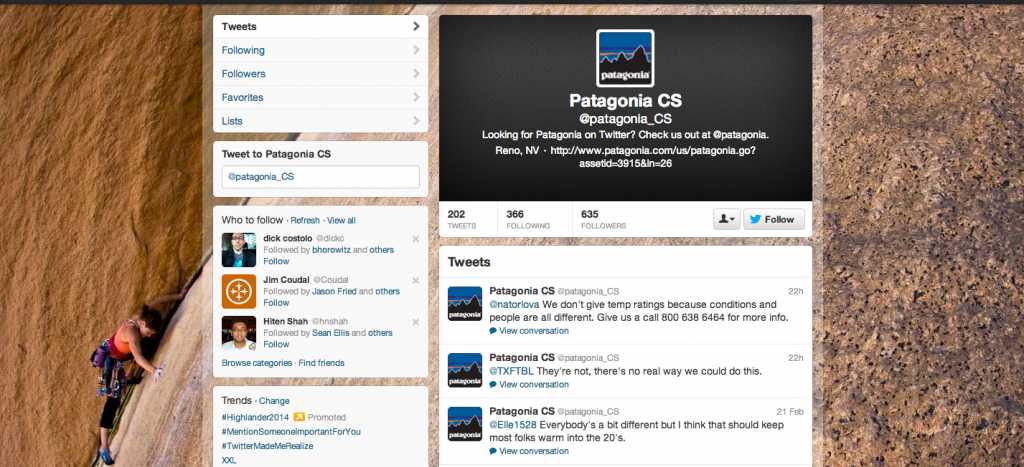As the digital experience continues to splatter into a thousand pieces, we are presented with a conundrum. Social media represents a huge opportunity to engage directly with customers and carry on conversations in real-time.
Think about that for a second.
If you wanted to get Dell Computer’s attention a few years ago, what would have been the steps? Well, you could call customer support, navigate a mammoth website and fire off an email with little confidence it will ever be read.
Or you could start a blog called “Dell Hell” as we saw earlier.
Today, you fire off a tweet with a hashtag and most likely will have an answer almost instantaneously. Companies like Patagonia have even set up their own Twitter account for customer service and reading the stream you can observe a nice dialogue going back and forth between customers and the company.
The other advantage is the ability for word of mouth to spread incredibly efficiently across these networks. Going “viral” with a goofy video on YouTube with Facebook and Twitter throwing gas on the flame is something we see on an almost a daily basis.
But we’ve ducked the question so far on why a website still matters.
With social media outlets like Facebook, Twitter, or Pinterest users are there for a ton of reasons. These companies have to produce revenue (or eventually they will) and so their entire goal is to coerce users to engage on their property for as long as possible. Most of these are using an advertising business model to monetize this engagement. So they collect massive streams of your digital fingerprints and use sophisticated algorithms to serve up ads they think you’ll like.
What happens next?
Well, a very small number of people will click on these ads. Given the absolute massive scale of the Internet even a very small number can represent huge dollars. It’s what has made Google, Facebook and Twitter very rich due to the size of their reach and why connected networks represent so much value.
But here’s why a website still matters.
When users click on an ad, or click a link in a tweet, or a photo on Facebook, or do a search they’re redirected to landing on a digital property. The marketer may have paid for this click or earned this engagement with remarkable content. At this point, they have pulled users onto their own site where they can control and tweak the experience.
When users engage on a social media property brands are effectively renting the real estate from a company like Facebook. Like a brutal landlord, Facebook can change anything they want at any time for any reason. Same thing goes for the Google search results.
But when the digital marketer gets that potential customer on their website they can start to control the interaction. They can dial down the noise in the design. Put in clean calls to action. Measure the engagement and adjust as needed.
This conversion is tough to take place on rented properties like Facebook or Twitter. But on a website a conversion can happen. While social media is a powerful force for word of mouth and maintaining top of mind awareness, the final conversion and profit for the majority of businesses still needs to take place back on site.
Key Takeaway: Social media is a wonderful and powerful tool. But don’t forget the brand experience is dictated by the rules of that platform. You’re just a renter on a social network. To earn a deep engagement, like closing a sale, this more than likely will have to happen back on a good old fashioned website where you own the property.

